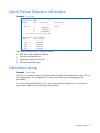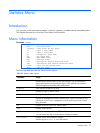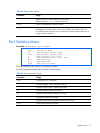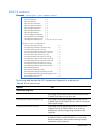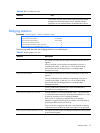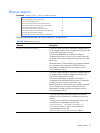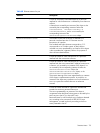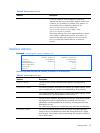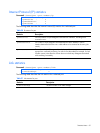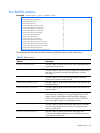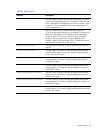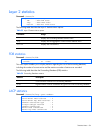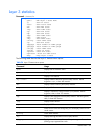
Statistics Menu 79
Table 48 Ethernet statistics for port
Statistics Description
dot3StatsInternalMacReceiveErrors
A count of frames for which reception on a particular
interface fails due to an internal MAC sublayer receive error.
A frame is only counted by an instance of this object if it is
not counted by the corresponding instance of the
dot3StatsFrameTooLongs object, the
dot3StatsAlignmentErrors object, or the
dot3StatsFCSErrors object.
The precise meaning of the count represented by an instance
of this object is implementation specific. In particular, an
instance of this object may represent a count of received
errors on a particular interface that are not otherwise
counted.
Interface statistics
Command: /stats/port <port number>/if
Interface statistics for port 1:
ifHCIn Counters ifHCOut Counters
Octets: 51697080313 51721056808
UcastPkts: 65356399 65385714
BroadcastPkts: 0 6516
MulticastPkts: 0 0
Discards: 0 0
Errors: 0 21187
The following table describes the interface (IF) statistics for a selected port:
Table 49
Interface statistics for port
Statistics Description
Octets—IfHCIn
The total number of octets received on the interface, including framing
characters.
UcastPkts—IfHCIn
The number of packets, delivered by this sublayer to a higher sublayer, which
were not addressed to a multicast or broadcast address at this sublayer.
BroadcastPkts—IfHCIn
The number of packets, delivered by this sublayer to a higher sublayer, which
were addressed to a broadcast address at this sublayer.
MulticastPkts—IfHCIn
The total number of packets, delivered by this sublayer. These are the packets
that higher-level protocols requested to be transmitted, and which were
addressed to a multicast address at this sublayer, including those that were
discarded or not sent.
For a MAC layer protocol, this includes both group and functional addresses.
Discards—IfHCIn
The number of inbound packets which were chosen to be discarded even
though no errors were detected to prevent their being delivered to a higher-
layer protocol. One possible reason for discarding such a packet could be to
free up buffer space.



